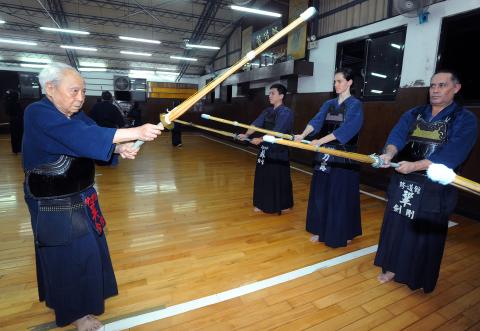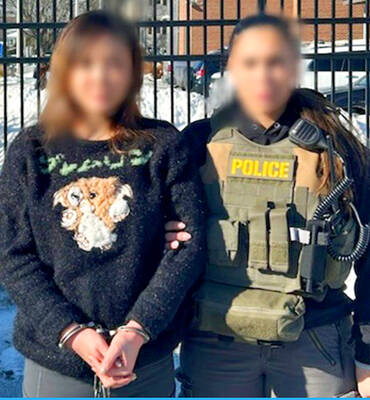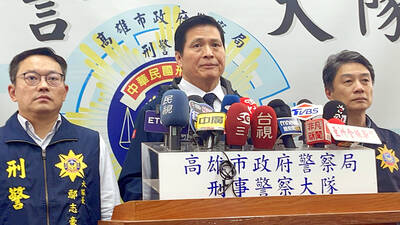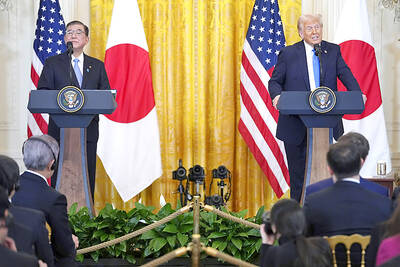Wu Chin-pu (吳金樸) still visits the kendo dojo at Tamkang University in Tamsui District (淡水), New Taipei City (新北市), every Wednesday to teach students the way and spirit of kendo, as he has for decades.
The 90-year-old Wu is still the holder of the best kendo score record in Taiwan’s international kendo competitions.
He first came into contact with kendo when he was 12, and has been in love with it ever since.

Photo: Wang Yi-sung, Taipei Times
He said that not a day goes by without him doing his best to become more adept in the martial art, despite having achieved hachidan — the eighth and highest rank — in kendo decades ago.
He rose to shodan (first rank) by the time he was in his third year of junior-high school. That was the year he took the championship in a kendo competition in Taipei by defeating 18 opponents.
It was that competition that provided him with the cornerstone for his success in future competitions, Wu said. Not only did it give him confidence, it also helped him realize that the key to kendo was “daily practice of all the elementary movements.”
“Self-confidence is one of the major factors to winning when going up against an opponent, but the only way to maintain that self-confidence is to practice the basic moves on a daily basis,” Wu said.
“The Japanese sensei that taught us was very strict about the training regimen, and at first it was a very painful process,” he said, recalling that swollen wrists often made practice so painful that many students thought about dropping out.
However, Wu said he always resumed training after the sensei gave his wrists a consolatory rub.
To improve his training, Wu ordered three custom-made bokuto, or wooden swords, of different weights. The lightest, at 400g, was for practicing the speed of his swings, the second and third — weighing 800g and 925g respectively — were used to improve his physical conditioning, he said.
He used the heavier swords in his joge buri exercises, in which the kendoka (a kendo practitioner), swings the bokuto from high to low.
Wu said he would practice his swing more than 1,000 times a day.
Wu had represented Taiwan for eight straight years in the International Kendo Competition, the predecessor to the World Kendo Competition, by the time he was 41.
In 1967, Wu, then a rokudan (sixth rank) kendoka, was just one point away from the championship when he took on a nanadan (seventh rank) kendoka, in the individual finals.
Although he came in second, Wu shocked Japan, which had won two consecutive Kendo championships, because no other Taiwanese had ever won an individual match.
Wu’s accomplishments in international competitions have yet to be surpassed by other Taiwanese kendoka.
After retiring from competitions, Wu turned to teaching. He has spent the past 34 years teaching kendo to Tamkang students, as well as doubling as a kendo sensei at the dojo sponsored by the Taipei Medical University Hospital and the Taipei City Government.
“One sees many bruises because the young are eager to swing their bokuto, but it is a start if they have the dedication to continue,” Wu said.
Students often ask Wu what they should do when they have hit a bottleneck in their practice. He said he always tells them to keep practicing.
That simple answer is based on the philosophy that a kendoka does not really know what kind of strike or move will succeed, but if they keep practicing the basics, sooner or later they will find that the problem has vanished, Wu said.
He said that not being able to wield a sword and continue to spar would be more of a setback than losing a bout.
Wu said he almost died in a car crash when he was 64 that left him with a badly broken right leg. The doctor had to put a pin in his leg, and Wu said he told him: “You must fix my leg. I want to participate in the next World Kendo Competition.”
Despite the long road to recovery, Wu returned to the top.
Like his own sensei, Wu is a strict teacher and often corrects the slightest error in posture or movement with a prompt thwack of his bokuto.
After a class ends, he is more of a grandfather, his students said.
“It is common for one to feel some measure of difficulty when pursuing a hobby or interest,” Wu said.
However, “kendoka should always try to remember what it was they wanted when they started learning kendo,” he said.
“Kendo is not just a sport that trains one’s body physically, it also seeks to discipline the mind,” he said.

Johanne Liou (劉喬安), a Taiwanese woman who shot to unwanted fame during the Sunflower movement protests in 2014, was arrested in Boston last month amid US President Donald Trump’s crackdown on illegal immigrants, the Criminal Investigation Bureau (CIB) said yesterday. The arrest of Liou was first made public on the official Web site of US Immigration and Customs Enforcement (ICE) on Tuesday. ICE said Liou was apprehended for overstaying her visa. The Boston Field Office’s Enforcement and Removal Operations (ERO) had arrested Liou, a “fugitive, criminal alien wanted for embezzlement, fraud and drug crimes in Taiwan,” ICE said. Liou was taken into custody

ON PAROLE: The 73-year-old suspect has a criminal record of rape committed when he was serving in the military, as well as robbery and theft, police said The Kaohsiung District Court yesterday approved the detention of a 73-year-old man for allegedly murdering three women. The suspect, surnamed Chang (張), was arrested on Wednesday evening in connection with the death of a 71-year-old woman surnamed Chao (趙). The Kaohsiung City Police Department yesterday also unveiled the identities of two other possible victims in the serial killing case, a 75-year-old woman surnamed Huang (黃), the suspect’s sister-in-law, and a 75-year-old woman surnamed Chang (張), who is not related to the suspect. The case came to light when Chao disappeared after taking the suspect back to his residence on Sunday. Police, upon reviewing CCTV

TAIWAN ADVOCATES: The resolution, which called for the recognition of Taiwan as a country and normalized relations, was supported by 22 Republican representatives Two US representatives on Thursday reintroduced a resolution calling for the US to end its “one China” policy, resume formal diplomatic ties with Taiwan and negotiate a bilateral Taiwan-US free trade agreement. Republican US representatives Tom Tiffany of Wisconsin’s 7th Congressional District and Scott Perry of Pennsylvania’s 10th District were backed by 22 Republican members of the US House of Representatives. The two congressmen first introduced the resolution together in 2021. The resolution called on US President Donald Trump to “abandon the antiquated ‘one China’ policy in favor of a policy that recognizes the objective reality that Taiwan is an independent country, not

The US-Japan joint statement released on Friday not mentioning the “one China” policy might be a sign that US President Donald Trump intends to decouple US-China relations from Taiwan, a Taiwanese academic said. Following Trump’s meeting with Japanese Prime Minister Shigeru Ishiba on Friday, the US and Japan issued a joint statement where they reaffirmed the importance of peace and stability in the Taiwan Strait and support for Taiwan’s meaningful participation in international organizations. Trump has not personally brought up the “one China” policy in more than a year, National Taiwan University Department of Political Science Associate Professor Chen Shih-min (陳世民)